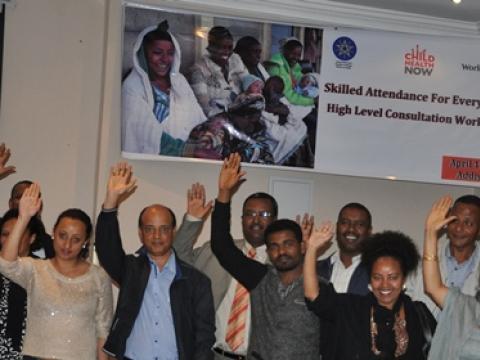World Vision calls government to give due attention to maternal, child health issues

World Vision Ethiopia (WVE) called upon the government of Ethiopia to continuously capacitate health professionals for realizing skilled birth attendance across the country. This was said during a High Level Consultation Workshop on the causes of Low Level Skilled Birth Attendance in Ethiopia. The workshop was organized by WVE Child Health Now! Campaign, in collaboration with the Ministry of Health and partners.
During the event, WVE further emphasized the need to:
Include the Basic Emergency obstetric and new borne care to the pre-service training for all health workers
integrate key messages about danger signs of pregnancy in both the Health Extension Program and health development armies;
ensure availability of midwives, essential medicines, supplies, and equipment at all the health facilities with special focus to the hard-to-reach places.
educate men on health issues through their Men Health Development Groups to ensure they provide better support to their wives and
improve collaboration and advocacy work with religious organizations, community based organizations and other relevant bodies to address beliefs that negatively affect the health seeking behavior of mothers.
Meanwhile, Dr. Ephrem Tekle, Federal Ministry of Health Maternal, Newborn and Child Health Directorate Director, indicated the government is committed to work on Skilled Birth Attendance, which is the potential indicator to reduce maternal mortality. Dr. Ephrem added the Federal Ministry of Health commends WVE in taking part to identify the gaps in Skilled Birth Attendance.
As part of accelerating its move on improving maternal and child health, WVE, conducted a formative assessment in August 2014 in selected Woredas of Amhara, Oromiya, and SNNP regions aiming to investigate the bottlenecks in reaching skilled birth attendance. According to the study, the key gaps in Skilled Birth Attendance are: poor recognition of serious signs of complications by mothers and other community members, misconceptions of health services and home deliveries, low level of women decision making power, misconceptions stemming from religious interpretations, far distance to and unaffordable transport means to reach health facilities, unavailability of staff and insufficient trained staff, lack of proper policies, job aids, to provide equality maternal, newborn and child health services and lack of drugs, equipment and Basic Emergency Obstetric and New borne Care services.